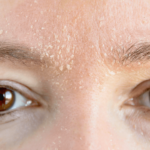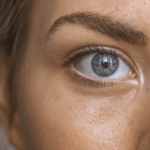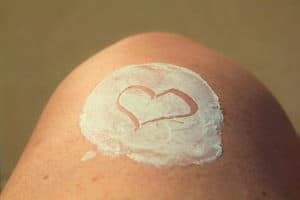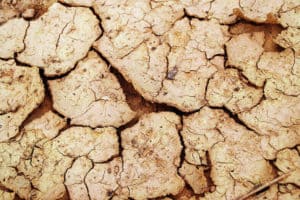Dry facial skin is more common than you think, and it gets worse as people get older. There are many possible reasons for your dry facial skin.
Why is my skin so dry on my face? The skin on your face may be really dry for a number of reasons, including:
- Temperature and Humidity Changes
- Harsh Soaps or Other Products
- Underactive Thyroid Gland
- High Blood Sugar (Diabetes)
- Excessive Sun Exposure
- Smoking
- Skin Disorders
- Imbalanced Skin pH
Luckily, there are home remedies and over-the-counter treatments that can help treat dry facial skin.
Read on to find out more about why the skin on your face is so dry and how to treat it!
Why Is My Skin so Dry on My Face? — 8 Possible Causes
The skin has more than 2,000 sebaceous glands per square inch. These glands produce a fatty or waxy substance called sebum which keeps your skin hydrated and protected from the environment. When you have fewer of these glands on the face or body, dry skin occurs.
Here are 8 possible causes for why the kin on your face is so dry:
1. Temperature and Humidity Changes
The most obvious possible cause of dry skin on the face is due to colder and/or drier temperatures. When the temperature and humidity drop, such as in the colder months, you should take extra care to moisturize your face. Use a moisturizer with a humectant such as hyaluronic acid. Apply the moisturizer after washing your face each morning and night.
After you wash your face, lightly pat dry your face, and then while still slightly damp, apply the moisturizer. This will help lock in the moisture for longer and help keep it hydrated.
2. Harsh Soaps or Other Products
The next fairly obvious possible cause of dry skin on the face is harsh soap or other skin care products you might be using. This is the easiest to change as you simply stop using the product or replace it with a gentler version. It’s best to avoid using bar soap or regular liquid soap on your face. Look for gentle cleansers that don’t strip away your natural oils and add hydration to your skin.
3. Underactive Thyroid Gland
An underactive thyroid gland, also called hypothyroidism, happens your butterfly-shaped thyroid gland fails to produce enough hormones to meet your body’s needs. This condition could cause your skin to become coarse, dry, scaly, thin, and pale.
The dryness associated with an underactive thyroid gland results from decreased activity of the eccrine glands. [1] The eccrine glands are your body’s major sweat glands.
In many cases, dry skin on the face is caused by an underactive thyroid that improves once you start thyroid hormone therapy.
4. High Blood Sugar (Diabetes)
People with abnormally high blood sugar levels (200 mg/dL or higher) are more likely to experience extremely dry and itchy skin. Sometimes, the skin could crack, which could lead to infection.
Neuropathy is another possible reason for skin dryness among people with high blood sugar levels. This condition is a type of nerve damage caused by chronic exposure to high levels of blood sugar and fats.
When the nerves are damaged, the body doesn’t produce sweat, which makes the skin moist and soft. The skin also doesn’t receive enough supply of nutrients and oxygen, causing it to become dry and weak.
5. Excessive Sun Exposure
How long can you be in the sun before it damages your skin? It only takes around 5 to 10 minutes before the sun’s harmful ultraviolet (UV) radiation starts to burn and cause long-term changes in the structure of your skin. [2]
One of the tell-tale signs of sun-damaged skin is dryness. The sun’s UV rays strip your skin of its natural hydration and essential oils, causing dryness, early wrinkling, and flaking.
6. Smoking
Smoking has a significant impact on a person’s appearance. The 4,000 plus chemicals in cigarettes and tobacco can destroy collagen and elastin, which gives your skin its elasticity and firmness.
Nicotine in cigarettes and tobacco constricts the blood vessels, depriving the skin of the face and the rest of the body of much-needed oxygen. This leads to delayed wound healing, infections, and early skin aging.
7. Skin Disorders
There are many skin diseases and disorders that could cause the skin on your face to become dry and irritated. Some examples are:
- Contact dermatitis – This refers to a skin condition that’s characterized by a red, itchy rash. It’s caused by direct contact with an irritating substance or allergen, including cosmetics, jewelry, perfumes, and soaps.
- Atopic dermatitis (Eczema) – This is also an immune-mediated disease that’s common among people with a family history of allergies or asthma. Unlike contact dermatitis, those with atopic dermatitis can get dry, red, flaky, itchy skin flare-ups at any time, for a number of reasons. These reasons include stress, diet, a lack of sleep and more.
- Psoriasis – This is an autoimmune disorder, a condition that causes the immune system to wrongly attack the body. A common symptom of psoriasis is patches of red, raised, scaly skin. Like atopic dermatitis, those with psoriasis can get flare-ups at any time but is more likely to flare-up from stress, low sleep, poor diet, etc.
8. Imbalanced Skin pH
On your skin’s surface, there’s a very fine film called the acid mantle. It serves as your body’s first line of defense against potentially harmful germs and other environmental contaminants.
The acid mantle’s average pH is between 4.5 and 6.7, which is slightly acidic. At this pH level, the skin is able to seal in moisture and prevent infectious agents, pollution, and irritations from entering your body.
If your skin’s pH gets imbalanced, this could cause dry skin on your face. The pH imbalance could be due to using the wrong soap or other products. Test stopping your products for a week or two to see if your skin becomes less dry.
How to Avoid Dry Skin on the Face

If you’re plagued by chronic dry skin on the face, and you don’t know what’s causing it, consult your dermatologist to get expert advice. We’ve looked at 8 possible causes to the question: ‘why is my skin so dry on my face,’ now, let’s address how to avoid dry skin on the face – here are 8 tips to keep your face hydrated and prevent it from drying out.
1. Check your home heating systems
Although it keeps you warm, your central heating system could make the problem worse by pumping your home of hot air that’s too dry. To combat this problem, consider using a high-quality whole-house humidifier to add moisture to the air.
2. Take brief showers or baths
How brief does a shower or bath have to be?
The length of the shower you take depends on your skin type (is it all dry, or perhaps you have dry and oily combination skin?) and how severe your dry skin or other skin disorder is. For instance, if you have eczema (atopic dermatitis) or excessively dry skin, you can take a shower for five minutes or less. Unless you live an active lifestyle and sweat a lot, showering three to four times per week is good enough.
3. Exfoliate once or thrice a week
Exfoliation offers many benefits for your skin. It helps skin care products to penetrate deeper and reveal brighter, smoother, and more even-toned skin by dissolving the dead cells on the surface of your skin.
There are two types of exfoliation: physical and chemical. Most skin-care experts recommend chemical exfoliation, which uses AHAs (alpha-hydroxy acids), BHAs (beta hydroxy acids), or enzymes because it produces more consistent and better results.
Physical exfoliation works, too. If you prefer it over chemical exfoliation, make sure to avoid products with beads or grains that are too large or rough because they could cause micro-tears in your skin.
4. Read the label carefully
This can be a mundane task; however, it’s important to know the ingredients that go into making soaps, shampoos, cosmetics, and other skin care products you’re planning to buy to prevent making the problem worse.
Here are a few harmful skincare ingredients that you need to avoid if you have dry or sensitive skin on the face:
- Alcohol
- Additives, dyes, and preservatives
- Fragrance
- Formaldehyde
- Parabens
- Phthalates
- Synthetic colors (for instance, FD&C or D&C are artificial colors)
- Triclosan or triclocarban (antibacterial agents)
5. Boost skin health from within
You can have the best facial moisturizer on the market, but if you have poor food choices, your skin will remain dry. If you want flawless, hydrated, and young-looking skin, you need to revamp your diet.
Some of the skin-friendly foods, oils, and drinks that you should add to your daily diet include:
- Almonds
- Avocados
- Fatty fish (e.g., herring, salmon, and tuna)
- Green tea
- Seeds (e.g., sunflower and flax seeds)
- Tofu and other soybean-based foods
- Dark chocolate and pure cacao-based food products
- Olive oil
- Oysters
- Sweet potatoes
- Dark green, orange, red, and yellow fruits and vegetables
6. Check the meds you’re taking
We’re not saying you should stop taking your medications without consulting your doctor. That’s a big no-no. If you think it’s the medication you’re taking or using on your skin that’s responsible for your dry facial skin, ask your doctor if he or she could prescribe an alternative or to adjust the dose.
Here are a few oral and topical medications that are known to cause dry skin:
- Acne medications (e.g., benzoyl peroxide and tretinoin)
- Cholesterol medications (e.g., pravastatin and simvastatin)
- Diuretics or water pills (e.g., hydrochlorothiazide or furosemide)
7. Use your moisturizer correctly
It’s best to apply the moisturizer when your skin is still damp (not extremely wet), so it can trap and bind the moisture to your skin. After the shower or washing your face, pat dry your face and immediately apply your moisturizer.
8. Find effective ways to manage your stress
Stress can affect your skin in a lot of ways, including drying your skin out. Whenever you’re stressed, your body produces excessive amounts of adrenaline and cortisol. Adrenaline causes you to sweat a lot, which may lead to dehydration. Meanwhile, cortisol causes dry skin by interfering with the body’s ability to retain water.
Conclusion – Why Is My Skin so Dry on My Face?
Why is my skin so dry on my face?
Dry skin on the face and body has many possible causes. 8 possible causes for the dry skin on your face include:
- Temperature and Humidity Changes
- Harsh Soaps or Other Products
- Underactive Thyroid Gland
- High Blood Sugar (Diabetes)
- Excessive Sun Exposure
- Smoking
- Skin Disorders
- Imbalanced Skin pH
In most cases, this is something that you can treat using home remedies and over-the-counter treatments.
We hope this article will help you prevent getting such dry skin on your face. If you still experience a dry face despite using home treatments or gentle facial care products and changing your diet, consult your dermatologist.

![Bleeding Pore on Nose [11 Possible Causes and Treatments] bleeding pore on nose](https://skincaregeeks.com/wp-content/uploads/2021/04/bleeding-pore-on-nose-150x150.jpg)
![Bruise Itches [Causes and Treatments for an Itchy Bruise] bruise itches](https://skincaregeeks.com/wp-content/uploads/2021/04/bruise-itches-150x150.jpg)


![Say Goodbye To Wrinkles On The Face [Easy Tips to Prevent Them] wrinkles on face](https://skincaregeeks.com/wp-content/uploads/2023/04/wrinkles-on-face-1-2-150x150.png)



